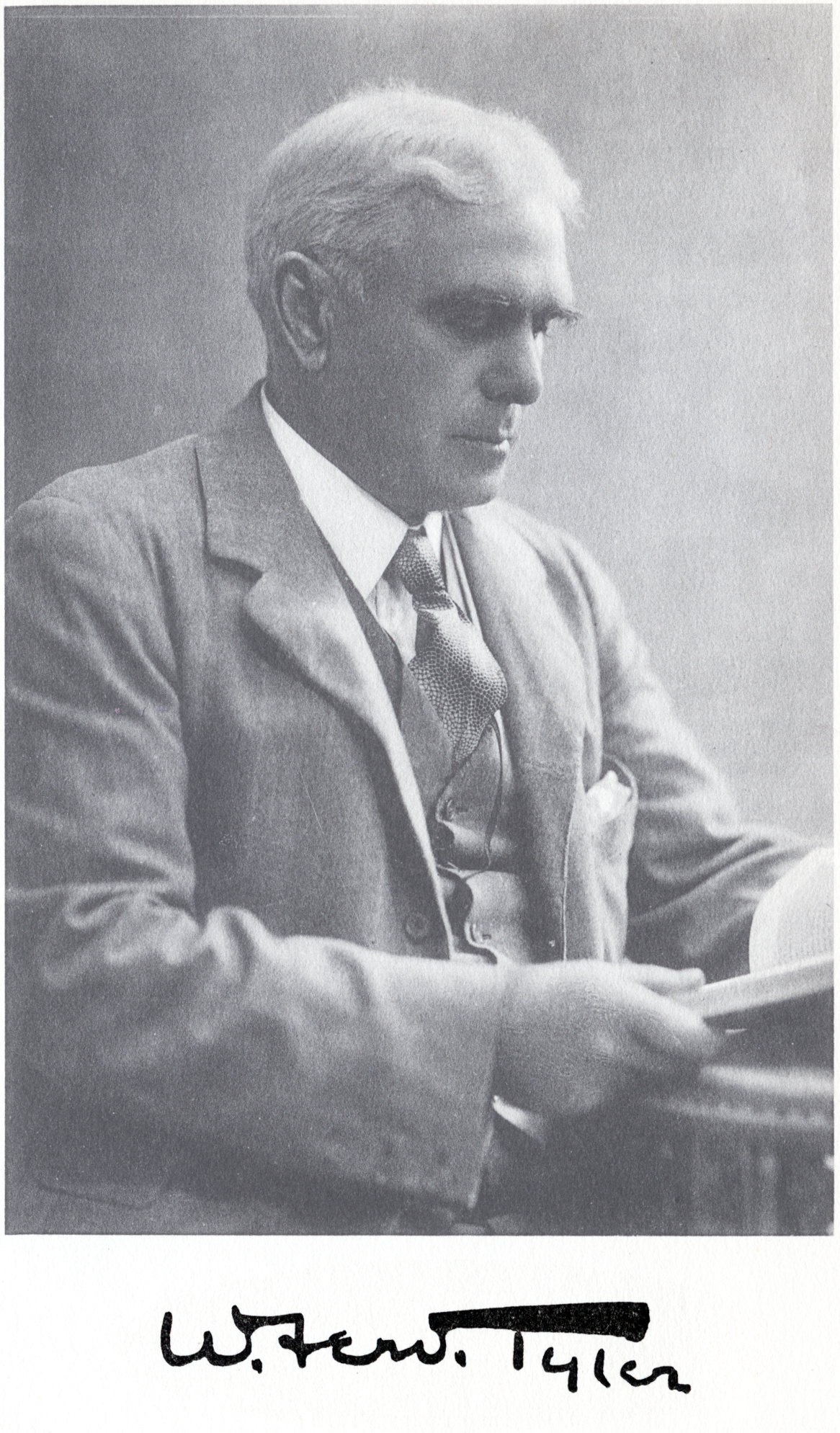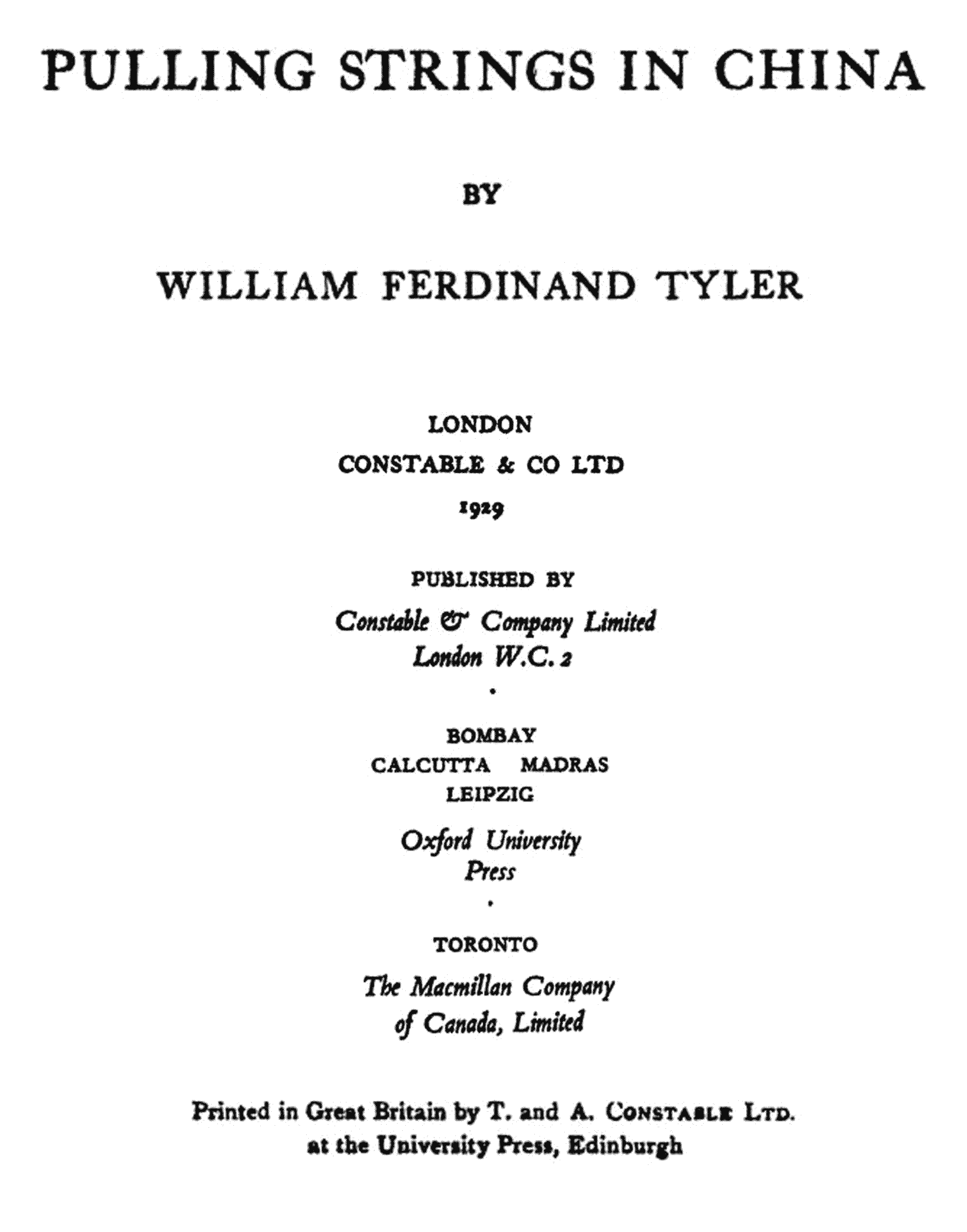Pulling Strings In China
by William Ferdinand Tyler

About the Author
William Ferdinand Tyler (William Ferdinand Tyler, 1865-1928), came to China with the British "Chinese Fleet" in 1888, lived in China for more than 30 years, worked in the Chinese Navy and Chinese Customs for a long time, witnessed the establishment and early development of the Chinese Navy, and Participated in the Sino-Japanese naval battle in the Yellow Sea and the defense of Weihai. In 1929, the book PULLING STRINGS IN CHINA, which recorded his experience in China during his lifetime, was published, which became an important historical material for the study of the Sino-Japanese War.

In the 30 years from 1888 to 1920, Tyler has witnessed Dadonggou naval battle, Weihaiwei siege in China, and has contacted with the various figures from important officials to the civilians and pirates. He talks frankly what he like to say in his book Pulling Strings in China (1889-1920 Tyler's Memoir), and tells what he saw and heard in China. From an angle of a person that is standing outside but lingering free from the benefit, he puts forward his views and understanding on the military, officialdom and the events and people at that time.

131*. Pulling Strings in China, By W. F. TYLER. 1929. (London Constable, 8vo, x 310 pp. 15s.)
Mr. TYLER'S modesty, tempered wth occasional touches of a
pleasant vanity, combined with a genius both for telling a good story
and for characterisation, are qualities which make this a very charming
book. His success in life was due primarily to a capacity for overcoming handicaps that would have crippled a weaker man. The deafness that fell upon him at the age of thirty did not blunt his eager
zest for life or dim the courage that carried him through the dangers
and difficulties of the strangely varied tasks that fell to his lot as a
member of that extraordinary service, the Chinese Maritime Customs.
Mr. Tyler in his time met most of the characters, famous and obscure,
Chinese and foreign, that played their part upon the Chinese scene
Sir Robert Hart, the great Inspector-General; M'Clure, the drunken
tug-boat skipper who became a Chinese Admiral Von Hanneken and
Detring; Basse, the German peasant who became confidential political
adviser to three powerful Viceroys at once; Liu Poo-chin, whose
cowardice was obscene, and Admiral Ting who lived and died a hero;
Li Hung-chang and Yuan Shih-kai — these and many more are described
with that touch of genius which makes them live again in Mr. Tyler's
pages.
The book is full of good stories and exciting adventures.
Perhaps the best are the tale of the ship's carpenter, a fine character
who was a double murderer, the story of how Mr. Tyler nearly had his
head cut off and how he tamed the Dragon in the rapids of the Upper
Yangtze. Many chapters, such as those describing the Yalu battle,
the siege of Wei-hai-wei, and Mr. Tyler's functions as neutrality
adviser, have considerable historical value, and in general Mr. Tyler
supplies that touch of human interest and local colour which the bare
facts of history so grcatly need.
It is a book that can be cordially
recommended to the general reader no less than to the student of
Chinese affairs.



Preface
MY friend Basse and I were in consultation in my little house
facing the racecourse at Shanghai.
Some years before we had
been junior officers on one of Sir Robert Hart's Revenue
Cruisers ; now we were considering how the three Viceroys
controlling the Navy on behalf of the Empress Dowager should
be advised about filling the vacancy of Commander-in-Chief.
Having made our decision we laughed at the situation. ` When
we retire,' said Basse, ' you must write our joint reminiscences ;
what shall we call it ? ' Thinking of the part that he was
playing I suggested ' Pulling Strings in China ' ; and that was
the genesis of this volume.
But later Basse and I went our respective ways, and then
he died. The original intention cannot therefore be carried
out in its entirety. Instead I write of my experiences and
give Basse his place in them ; but out of sentiment I keep the
title, though it has lost the suitability it would have had, had
Basse's share been added.
I am greatly indebted to Dr. H. B. Morse and Sir John Pratt
for the scrutiny of my references to history, but that does not
imply acceptance by them of all my views and statements on
the subject. I am also indebted to Mr. J. Woltman, Mr, L. A.
Lyall and Mr. S. F. Mayers for encouragement and advice.
BEAULIEU-SUR-MER, March, 1929.
Table of Contents
I.
EARLY DAYS.
1 . EDUCATION1
2. SAILING SHIP DAYS 4
3. MY FRIEND THE MURDERER 12
II.
MEN-OF-WAR.
1. NAVAL TRAINING 20
MARTIN AND THE BEAR 22
CHRITSTMAS ISLAND CRABS23
2. CHINESE REVENUE CRUISERS30
HOW PAYNE-GALLWAY CUPPED THE CAPTAIN34
3. THE CHINESE NAVY 35
III.
THE YALU BATTLE.
1. THE FIGHT 46
2. AFTER THE BATTLE 57
THE GOLF LINKS 61
IV.
THE SIEGE OF WEIHAIWEI.
1. THE BEGINNING 63
2. THE ATTACK 70
THE MUTINY 75
THE EXECUTIONERS 81
3. THE CAPITULATION 86
WESTERN EDUCATION AND INFLUENCE 93
V.
INTERLUDE.
1. HOME LEAVE 99
A MATTER OF HONOUR 101
2. ABOUT FEAR 106
THE RAILWAY BRIDGE 109
3. A SHORE JOB 112
VI.
THE CHINESE MARITIME CUSTOMS.
1. ITS BIRTH 119
2. THE MARINE DEPARTMENT 127
3. THE COAST INSPECTOR'S WORK 136
VII
THE YANGTSZE DRAGON 150
VIII.
THE BOXER REBELLION.
1. THE BOXER TIME 164
2. THE METAMORPHOSIS OF BASSE 170
IX.
THE YELLOW RIVER 179
X.
THE CHINESE ADMIRALTY.
1. THE RUSSO-JAPANESE WAR 185
2. THE NAVAL SECRETARIAT 192
XI.
A LULL IN WORK.
1. THE FEATHER STORY 200
THE RUSSIAN GIRL'S IDEAL 203
2. PIRACY 207
3. MISSIONARIES 213
THE FRENCH PRIESTS 214
THE LADY MISSIONARY 216
THE GERMAN JESUIT 218
THE MOUSE-GIRL 219
XII.
CHINESE POLITICS.
1. THE DYNASTIC REVOLUTION 222
2. YUAN SHIH-KAI 226
3. THE SECOND REVOLUTION 233
XIII.
SHANGHAI 242
XIV.
THE GREAT WAR.
1. NEUTRALITY WORK 258
2. CHINA AT WAR 260
XV.
THE ADVISERSHIP.
1. THE RIVER COMMISSION 267
2. PEKING DUTIES 271
3. CHINESE POLITICS 278
4. THE BARCELONA CONFERENCE 282
APPENDIX
A. THE CHINA EDUCATIONALIST 287
B. A MEMORIAL 292
C. THE YELLOW RIVER 296
D. INSTRUCTIONS TO BOARDING OFFICERS 299
E. SHANGHAI AND THE WAR 302
... illustrations by Google\images ...






